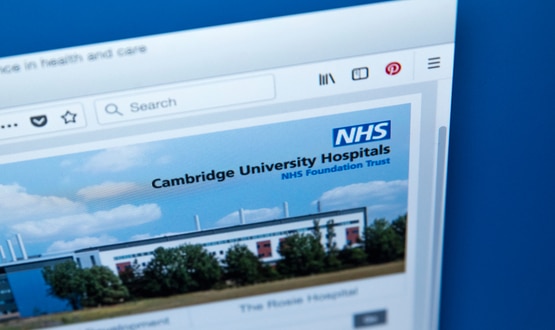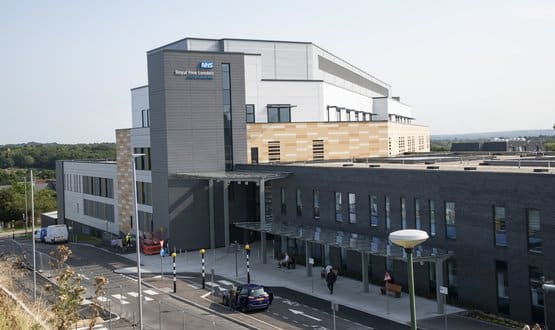Mobile health and apps news in brief
- 6 December 2019

This month’s mobile apps round-up features an augmented reality asthma app to teach children how to use their inhaler, and a self-care app helping heart patients in Cambridge exercise safely.
Asthma app to be rolled out across Suffolk
An augmented reality asthma training app is being rolled out across Suffolk healthcare and education settings by Suffolk Public Health and Orbital Media.
MySpira, the world’s first metered dose inhaler training app to use the new augmented reality functionality, will be available in Suffolk for free until 1 April 2020, promoted via local hospitals, GP surgeries, pharmacies and primary schools across the county.
Research suggests that 97% of children misuse their inhaler. To help reduce the likelihood of serious or fatal asthma attacks occurring in children, MySpira aims to improve the training of correct inhaler technique, using a combination of augmented reality and gameplay.
Paul Brown, chief executive of Suffolk Primary Care, said: “Research has shown that, when asthma sufferers use their inhalers incorrectly, less than 5% of the medicine reaches where it’s needed in the lungs.
“Where proper inhaler training programmes have been put in place, however, emergency admissions have been reduced by 50% and asthma deaths by 75%.
“We hope that the introduction of MySpira across Suffolk Public Health services will not only improve technique and compliance, and therefore increased health, but will also result in fewer serious or fatal asthma attacks in the county.”
MySpira introduces likable characters and tactile interactions, to engage children who have asthma with games they can play with parents, siblings or friends. During the 20-minute experience, the child is taught about asthma keywords, triggers, different types of inhalers, how to prepare the inhaler and spacer, and how to inhale the medicine correctly.
Activ8rlives App teaches heart patients to exercise safely
A new self-care exercise programme using the Activ8rlives App has been launched in Cambridge to help patients recovering from heart conditions learn how to exercise safely and monitor and record their health metrics, in order to track their progress and get support from a personal health coach.
The app forms part of an initiative called Active+me, developed by Aseptika, to give local cardiac patients guided support.
It is being trialled by the Eastern Academic Health Science Network and Cambridge University Hospitals.
The programme includes classes in which patients are guided to exercise safely and appropriately.
Alongside the classes, patients are given monitors to record their health metrics at home, which are uploaded to the Activ8rlives4 App. Their data is then shared with their personal health coaches at Addenbrooke’s Hospital.
Alan Darby, cardiac rehabilitation lead practitioner at Addenbrooke’s Hospital, said: “With more than 26,000 people recorded as living with heart disease in Cambridge and Peterborough and an ageing population, we have a growing need to address the unique health issues facing people living with heart disease and support patients in our region to safely manage their health and reduce the chances of them having to go back to hospital.”
Locum’s Nest launches UK-first digital collaborative staff bank for medics
Health-tech app Locum’s Nest has launched The Digital Collaborative Bank, the NHS’ first digital collaborative staff bank for doctors, in partnership with eight large acute NHS trusts.
The Digital Collaborative Bank will provide locum doctors with an online platform to access shifts at all participating trusts.
The platform aims to create one national staffing pool across the whole of the NHS and in turn, save it £1bn by 2025.
Nicholas Andreou, co-founder of Locum’s Nest, said: “The power of this collaboration enables trusts across the service to pool their individual staff banks, thereby creating a much larger pool of potential staff and revolutionising staffing nationwide.
“The Digital Collaborative Bank goes over and above our work with the app, allowing any trust and any doctor across the UK to be part of a universal pool. Together this will save the NHS millions of pounds per year, all of which can be put to better use hiring more nurses & doctors, updating equipment or offering new services.”
Forward Health announces new trust partnerships
Forward Health, the communications app created by NHS junior doctors, has announced that over five million messages have now been sent via its clinical messaging platform.
A range of new trusts are now working with Forward to roll out their technology across wards, taking the total to 20. New partners include Bridgewater Community Healthcare NHS Trust; Kingston Hospital NHS Foundation Trust; and Wrightington, Wigan and Leigh NHS Foundation Trust.
The app was launched in 2017 and is already used by around 20,000 NHS staff across more than 100 hospital sites.
Forward allows clinicians to securely and compliantly share information with colleagues, to make clinical decisions more effectively, and manage their workload.
The platform removes the need for insecure consumer messaging apps and reduces reliance on outdated forms of communication such as the pager.
Co-founder and co-chief executive Dr Barney Gilbert said: “It’s great to see how quickly Forward has grown, from an idea we dreamed up during night shifts to an app which is delivering millions of messages and making a tangible difference to clinicians and patients across the UK.”
Touch Surgery app helps train doctors in surgical techniques
London North West University Healthcare NHS Trust (LNWUH) is using a mobile app to help train surgeons.
Abdul Ahmed, a maxillofacial surgeon at Northwick Park Hospital, uploads the step-by-step video guides to the Touch Surgery app along with advice, insights and Q&As.
“An instructional video is always going to be more useful than a book and the fact that more people have access to smart phones than expensive medical textbooks shows how useful it can be,” he said.
“I’ve uploaded several videos and it’s great to be able to practically share what I do with students and fellow surgeons in countries that don’t have the same resources.
“I also use it with trainees in the UK at the London School of Surgery prior to them dealing with patients.”




